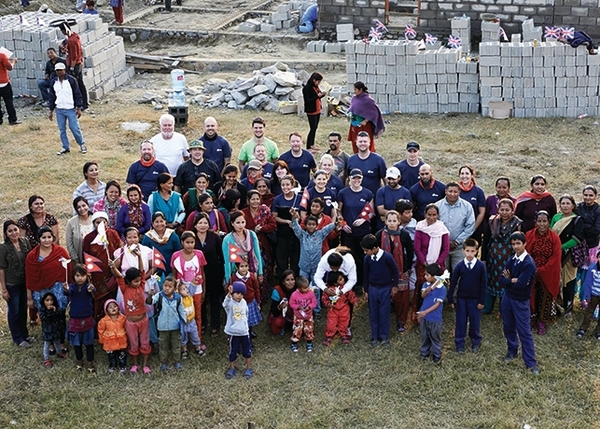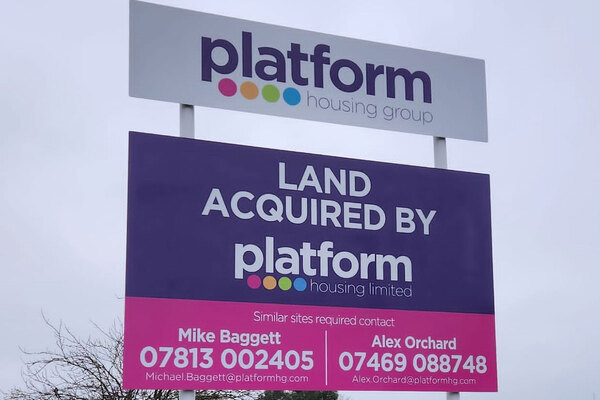Out of Africa
Our Into Africa competition, sponsored by the London Housing Foundation, gives three lucky readers the chance to visit social housing projects on the continent. Jess McCabe reports on what this year’s winners learned from their prize trips

In the UK, social housing has a long and storied history. But in most of Africa, the sector’s narrative is only just beginning to unfold, and three lucky readers will soon have the chance to go to see it first hand.
For the second year running, Inside Housing is partnering with charity Homeless International and the London Housing Foundation for our Into Africa competition. The winners will have the chance to travel to Africa for seven days, visiting some of the housing projects that Homeless International supports.
As this year’s winners found, the competition gives the opportunity to learn about some of the first social and affordable housing projects to be launched on the continent. For a taste of what the winners have in store, follow the journey taken by one of last year’s winners, Alex Willey, asset strategy manager at Affinity Sutton, as she visited some of the first affordable housing projects in Malawi.
Larry English, chief executive of Homeless International, encourages housing professionals at all stages of their career to apply: ‘The UK has a massive reservoir of talent around housing. About 250,000 people work in the UK housing sector - professional people. For us, the sad thing is they’re focused only on the UK.’
These projects are getting off the ground with little or no government subsidy, and often in the face of significant housing problems. For example, another of this year’s winners, Rob Hunter, a research officer at Walsall Housing Group, travelled to Tanzania, where 66 per cent of the country’s 44 million people live in urban slums. As part of his travels, Mr Hunter visited an informal settlement in the country’s biggest city, Dar es Salaam.
‘While the levels of poverty I saw and the chaotic environments were shocking to me, the settlement was actually pretty good,’ he explains. ‘All the homes were permanent structures built of solid materials. Many had electricity and there is now an established rubbish collection by the municipal authority.’
But as the last of this year’s winners found, learning can go both ways, and some of these challenges are definitely shared. Joe Thomas, housing services manager at One Housing, who visited Nairobi in Kenya, says: ‘I found many parallels in their desire to become more self-financing and develop into a social enterprise in order that profits could be reinvested into their social goals for their own Kenyan market.’
Alex Willey, asset strategy manager at Affinity Sutton and one of this year’s Into Africa winners, reports from Malawi:
4 September, Blantyre
I survived the overnight flights. Phew! I’ve been met with welcoming smiles at every turn - Malawi is definitely living up to being the warm heart of Africa so far. Inflation is at 30 per cent. I observed a legal meeting about setting up an investment company to help non-governmental organisations to get around
the issues of loans.
5 September, Blantyre
I toured one of Malawian housing organisation Centre for Community Organisation and Development’s first sites, where it is building low-cost rental accommodation. CCODE is one of the first organisations to do this in Malawi, and is at the dawn of a new era for social housing in the country.
Getting new bricks to the housing site is a challenge, therefore the land on the site is dug up and turned into bricks. The landscape changes dramatically between the dry and rainy seasons. There were some unfamiliar challenges: or were there? Although not quite the same, or as extreme, climate change mitigation is moving up the agenda for the UK and sustainability of building materials is already pretty high.
Next was a four-hour car journey from Blantyre in the south of Malawi to the capital, Lilongwe. I travelled with Siku Nkhoma, chief executive of CCODE, so I got the chance to learn more about the housing situation en route and its similarities to the UK. The road acts as part of the border between Malawi and Mozambique, leading to the phrase: ‘And on the left-hand side of the road, Mozambique.’
6 September, Lilongwe
It was almost just another day in the office, aside from the sounds of Lilongwe city life drifting in through the windows. We worked with the architects through the principles behind the planned site in Blantyre we visited yesterday. The discussion ranged from what makes a good neighbourhood to how to cater to different demographics of residents. Familiar territory, until I remembered that what they are planning will be a first for Malawi. There has never been a planned settlement of this size for low-income households. Talk about a blank canvas!
9 September, Lilongwe
This afternoon, we visited an informal settlement of around 50,000 people. That in itself was mind boggling: 50,000 people living in houses they have either built themselves on often unregistered land or are renting informally and with no regulatory framework. I could write about the extreme poverty (which there was) but it was hearing about the community and why people lived here that really helped me to start to understand the context of housing in Malawi.
For example, three brothers living in a two-room property felt safe and secure but did not like having to pay a charge for their water.
We went from the settlement to CCODE’s first site for low-rental housing. Thirty homes have been completed at what will be a 90-unit site, all aimed at low-income households. The homes were beautifully constructed, well laid out and with good amenities nearby. The excitement around the site is palpable at how this could be the start of transforming the landscape of housing in Malawi.
For the first two years, CCODE hired only women in leadership roles. I am by no means an ardent feminist but seeing one female contractor exquisitely manage a team of 120 workers to deliver these houses was extremely pleasing.
11 September, Lilongowe
The last two days have been an international whirlwind of social housing. I’ve been taking part in an international workshop conceived and organised by Homeless International and run by Bolton at Home and the Wheatley Group. We’ve been hearing about different intended approaches to how homes are allocated, what agreements you put in place and how payments are made. The similarities have been evident and sometimes surprising. The differences have thrown up challenges that have often required some serious lateral thinking (good job we’ve been provided with ample tea and cake, and usually chicken wings - the UK seriously needs to rethink its approach to mid-morning snacks).
Some unfamiliar issues were thrown up. What do you do if your country doesn’t keep any criminal records? Or any financial or credit records for that matter? There was an interesting case in Nepal where properties were allocated by a committee that included a representative from the media. The aim of this was to provide formality, add weight and ensure a positive message surrounded the country’s first foray into social housing.
As for tenancy agreements and rent payments, I found more familiar territory. One organisation from Malawi is already set up for mobile phone rent payments and SMS reminders. Many of the rights and responsibilities in the tenancy agreements were universal.
But an interesting debate arose around limiting landlord responsibilities and how prescriptive to be for tenants.
In several countries the organisations’ reputations are at such a critical stage that they will have to act fairly and responsibly if they want to succeed. This is not only to establish their own good credentials but also to ensure they stand out from any existing private housing providers which may be renowned for being less scrupulous. All of this could be seen to strike a chord with the UK industry and could well be an approach some would welcome if we were starting from scratch.
12 September
It was my turn to run a workshop session around how you know whether your approach to asset management is working and what indicators you could use to ascertain this. The session began with me being asked to define asset management - nothing like a challenging start!
It didn’t take long for the groups to list their indicators and interestingly, several of them included length of housing waiting lists as a sign of how well assets are performing. Considering there is a waiting list of 300 for 30 houses in Malawi, this could be a tough one to affect. For them one of the key underlying drivers for doing this sort of housing at all is to meet chronic demand.
The day was perfectly concluded with a trip out for dinner with eight others in a taxi designed for about five adults (there’s nothing like getting to know your colleagues) not to mention the ingenious use of indicators as headlights.
13 September
The final day of the workshop was an emotional but satisfying end to an incredible week. Each group was asked to list key actions they would take away from the week and these ranged from addressing the issue of allocating properties to staff, to clearly defining who does what when it comes to repairs.
We marked the end of the workshop with a trip to Lake Malawi on possibly the hottest bus on the planet, complete with roadside donuts.
Then the real business of celebrating all our hard work began with one of the most vibrant and raucous ‘office’ parties I’ve ever been to. Hosted by CCODE in the backyard of their office in Lilongwe I learned that:
- the best African music is Congolese;
- cultural dance used to be on the Zambian national curriculum;
- if you get up to dance you have to at some point go into the middle of the circle and show off your moves (fortunately managed to avoid this one);
- the local beer goes down a treat.
How to enter
The winners of Inside Housing and Homeless International’s Into Africa competition will visit a social housing develop-ment programme on an accompanied seven-day trip. They will learn about developing homes in some of the poorest communities in the world, and be able to use their experiences to influence their work in the UK.
To enter you need to explain the following in 500 words or less:
- how you think winning this trip will add to your understanding of social housing and enrich your work in UK housing
- what your experience in the UK housing sector can bring to the work of Homeless International in Africa
A panel of judges will be established by Inside Housing and Homeless International to decide on the three winners who will be announced at the UK Housing Awards.
The entry deadline is 14 February 2014. Entries can be made at www.homeless-international.org/intoafrica










